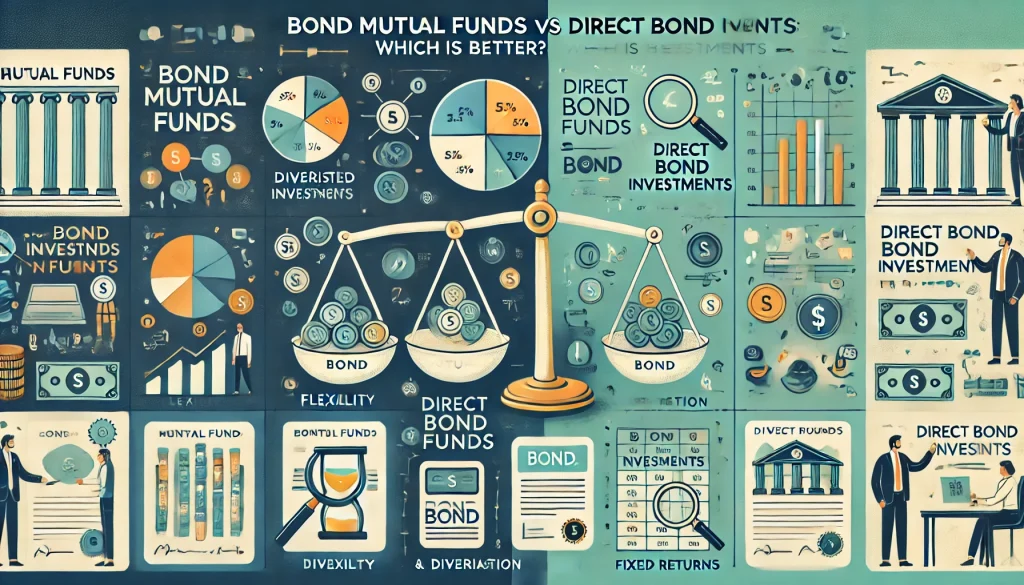
Many investors often wonder whether they should invest in bond mutual funds or bonds directly, especially in times of rising interest rates. With so many factors to consider, it can be challenging to determine which option aligns best with your financial goals. Both investment options come with their own set of advantages and disadvantages. So, go through this guide to explore the key differences between bond mutual funds and direct bonds and understand which one suits your financial strategy.
What Is a Bond Mutual Fund Investment?
A bond mutual fund is an investment instrument that manages a variety of bonds, such as government, corporate or municipal bonds. While the fund may occasionally invest in other types of securities, its main focus is on bonds. Investors buy shares in the fund, and each share represents a proportionate ownership of the bond portfolio.
Professional fund managers use the capital from investors to buy and sell bonds based on the fund’s investment goals. Bond mutual funds typically provide monthly payouts, which can either be distributed directly to the investor or reinvested into the fund to enhance returns through compounding. By pooling resources, bond mutual fund investors gain access to a broader range of bonds than they could manage on their own.
What Is a Direct Bond Investment?
A direct bond investment refers to purchasing individual bonds, such as government or corporate bonds, directly from the issuer or through a broker. The bond issuer typically commits to paying a fixed or variable interest, referred to as the coupon, at regular intervals. A bond also has a set maturity date, at which time its face value is repaid, usually equal to the price at which it was originally issued.
As the bondholder, you have the option to hold the bond until maturity or sell it earlier in the secondary market, though the bond’s price may fluctuate depending on market conditions. Direct bond investments offer more control and potentially higher returns compared to bond funds.
What Is the Difference Between Bond Mutual Funds and Direct Bond Investments?
The following table shows a comparison of bond mutual funds vs bonds that are directly invested:
| Parameters | Bond Mutual Fund | Direct Bond |
| Income Predictability | Income payouts fluctuate depending on the bonds selected and sold by the fund manager, as well as prevailing market rates | Provides a steady income that is predetermined at the time of investment |
| Minimum Investment Amount | Requires a smaller investment amount | Typically requires a larger investment |
| Management Style | Managed by professionals who follow either active or passive management style | Handled directly by the investor |
| Liquidity | Offer high liquidity since their shares can be sold at any time | Liquidity depends on the type of bond. Treasury and some corporate bonds are more liquid, while municipal bonds are less liquid |
| Associated Costs | Sales and management costs may apply, varying based on the share class | Typically, a commission is charged for buying or selling a bond, but no ongoing fees |
| Frequency of Income | Usually every month | Usually on a half-yearly basis |
| Auto Coupon Reinvestment Option | Applicable | Not applicable |
| Diversification | Offers better diversification with a single investment, as funds invest in hundreds of bonds | Proper diversification requires owning multiple bonds |
| Customisation | Not possible | Possible |
| Level of Control and Transparency | Fund managers provide details on the fund’s objectives, strategies and holdings, including cash for admin purposes. However, investors do not have control over investment choices or their tax consequences. | Investors have full control over transactions and tax implications, as they manage them independently. |
| Tax Implications | Capital gains taxes are due when shares are sold for a profit. Additionally, taxes are incurred when the fund manager sells bonds for a profit, with those costs passed to investors. Investors may also face taxes on gains even if they have not sold their shares. | Capital gains taxes apply if the bond is sold for a profit before it matures. |
What Are the Benefits of Bond Mutual Fund Investments?
Here are some benefits of investing in bond mutual funds:
- Diversification Made Easy: Bond funds let you spread risk across multiple issuers and maturities by pooling investments into a diversified portfolio, offering more stability.
- Expert Management: Professional fund managers handle bond selection, using their expertise to aim for better returns than you might achieve by investing in individual bonds.
- High Liquidity: Bond funds provide daily liquidity. For even quicker access, bond ETFs can be traded throughout the day like stocks, offering instant liquidity.
- Consistent Income: Bond funds can provide a steady income stream or reinvestment opportunities based on your preferences and the fund’s objectives.
- Affordable Diversification: With lower minimum investment requirements than individual bonds, bond funds make it easier to create a diverse bond portfolio without requiring significant capital.
- Time-Saving Research: Evaluating bond funds and their managers is less time-intensive than analysing individual bonds, especially for complex instruments like high-yield bonds or bank loans.
- Institutional-Level Pricing: Bond funds often benefit from institutional buying power, securing better prices on bonds compared to individual investors.
What Are the Benefits of Direct Bond Investments?
Investing in direct bonds offers several benefits tailored to your financial needs:
- Control and Clarity: Bonds come with fixed coupon rates, face values and maturity dates, giving you a clear understanding of costs, returns and tax implications.
- Customisation: You can choose bonds based on your risk tolerance, investment horizon and expected returns, aligning them with your financial goals. Moreover, you have the flexibility to adjust your bond portfolio as market conditions and interest rates change.
- Predictable Returns: Bonds provide a steady income stream, making them ideal if you seek regular income with the assurance of receiving your principal back at maturity.
- Lower Risk: Bonds are a safer investment option since they are backed by the issuer’s creditworthiness. In case of default, as a bondholder, you have a higher claim on the issuer’s assets compared to equity investors, making bonds less risky than stocks.
- Diversification: Adding bonds to your portfolio helps reduce overall risk and volatility. Since bonds have little correlation with stocks, they act as a stabilising factor during market fluctuations.
- No Extra Costs: By purchasing bonds directly, you avoid additional management fees, keeping your investment expenses low.
Final Word
Whether you choose bond mutual funds or direct bond investments depends on your individual financial goals and preferences. Bond mutual funds offer diversification, professional management and high liquidity, making them a convenient option for those seeking a hands-off investment. Direct bond investments provide more control, predictable returns and customisation, making them ideal for those who prefer to manage their portfolio actively. A combination of both may be the best approach for many investors, allowing for balance and flexibility.


